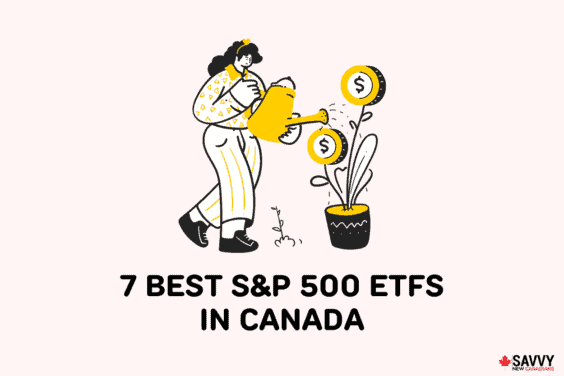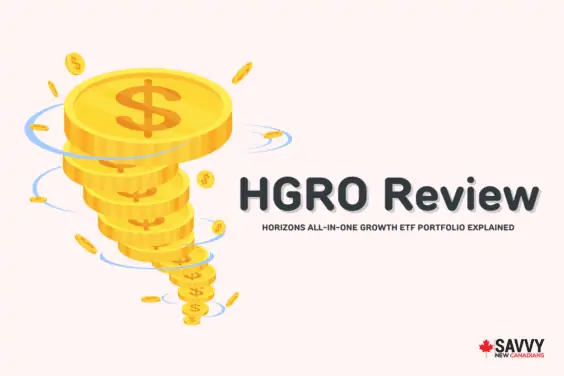ETFs, or exchange-traded funds, are an excellent method for investors to diversify their portfolios with little research or experience necessary.
As more ETFs have come onto the market in recent years, mutual funds have slowly fallen out of favour. The higher expense ratios charged by mutual funds mean they are no longer the go-to passive investing option.
ETFs not only come with lower fees but also offer convenience. Like stocks, ETFs are available for trading on discount brokerages such as Wealthsimple and Questrade.
For those looking for safer investments, bond ETFs are a great option. While investing in individual bonds can be a complex process, these ETFs make it easy to add bonds to your portfolio.
This Vanguard Canadian Short-Term Bond Index ETF (VSB) review will detail its holdings, performance, fees, advantages and disadvantages, and how Canadian investors may buy it.
What is VSB?
The Vanguard Canadian Short-Term Bond Index ETF, or VSB, is a Vanguard Canada ETF that trades on the Toronto Stock Exchange.
VSB tracks the Canadian bond index with short-term, dollar-weighted average maturity. This means it tracks Canadian bonds with a maturity of 1-5 years.
Canadian investors can look to Vanguard bond ETFs in Canada to diversify their portfolios.
Generally, bonds are referred to as fixed-income assets. They do not provide a lot of long-term capital growth but pay regular monthly distributions.
Here are some key facts for VSB as of February 2023:
- Inception date: November 30, 2011
- Number of bonds: 490
- Yield to Maturity: 4.4%
- Average Duration: 2.7 years
- Average Maturity: 2.8 years
- Average Coupon: 2.6%
- Management fee: 0.10%
- MER: 0.11%
- Assets under management: $1.19 billion
- 12-month trailing yield: 2.24%
- Distribution yield: 1.63%
- Distribution frequency: Monthly
- Eligible accounts: RRSP, TFSA, RRIF, TFSA, DPSP, RDSP
- Currency: CAD
VSB Holdings
VSB holds a total of 490 short-term bonds with an average maturity date of 2.8 years.
Here are the top ten holdings in VSB:
| Holding Name | % of Market Value | Market Value | Face Amount | Coupon Yield | Maturity Date |
| Canadian Government Bond | 2.80406% | $38,024,609.87 | $38,860,000.00 | 2.75% | August 1, 2024 |
| Canadian Government Bond | 2.53490% | $34,374,709.63 | $37,501,000.00 | 0.50% | September 1, 2025 |
| Canadian Government Bond | 2.26624% | $30,731,529.90 | $31,310,000.00 | 3.00% | November 1, 2024 |
| Canada Housing Trust No 1 | 2.02712% | $27,488,823.51 | $28,039,000.00 | 2.90% | June 15, 2024 |
| Canadian Government Bond | 1.87230% | $25,389,476.39 | $26,135,000.00 | 2.75% | September 1, 2027 |
| Province of Ontario, Canada | 1.59334% | $21,606,558.33 | $22,360,000.00 | 2.60% | June 2, 2025 |
| Canadian Government Bond | 1.56527% | $21,225,982.20 | $23,645,000.00 | 0.25% | March 1, 2026 |
| Canada Housing Trust No 1 | 1.55141% | $21,037,967.74 | $22,250,000.00 | 1.95% | December 15, 2025 |
| Canadian Government Bond | 1.54968% | $21,014,483.53 | $22,989,000.00 | 1.25% | March 1, 2027 |
| Canadian Government Bond | 1.50113% | $20,356,115.02 | $21,222,000.00 | 1.50% | September 1, 2024 |
Here is the breakdown of bond issuers in VSB:
| Bond Issuer | Weighted Allocation in VSB Fund |
| Treasury/Federal | 29.4% |
| Financial Institutions | 23.1% |
| Provincials/Municipals | 20.2% |
| Agencies | 14.8% |
| Industrials | 8.9% |
| Supranational | 2.3% |
| Utilities | 1.1% |
| Cash | 0.2% |
Here is the credit rating by allocation in VSB:
| Credit Rating | Weighted Allocation in VSB Fund |
| AAA | 47.0% |
| AA | 32.0% |
| A | 12.8% |
| BBB | 8.0% |
| NR | 0.2% |
And finally, here is the distribution by credit maturity in VSB:
| Maturity Time | Weighted Allocation in VSB Fund |
| Over 5 Years | 4.9% |
| 4-5 Years | 21.2% |
| 3-4 Years | 17.3% |
| 2-3 Years | 27.9% |
| 1-2 Years | 28.5% |
| Under 1 Year | 0.2% |
VSB Returns and Performance
Since its inception, VSB has provided investors with an average annual return of 1.39% and a cumulative return of 16.69%.
Here is a visual of how the NAV price and Market Price have performed each year since inception:
| Year | Total Return by NAV | Total Return by Market Price |
| 2022 | -3.96% | -3.97% |
| 2021 | -1.03% | -1.05% |
| 2020 | 5.14% | 5.14% |
| 2019 | 2.86% | 3.19% |
| 2018 | 1.79% | 1.69% |
| 2017 | 0.00% | -0.36% |
| 2016 | 0.77% | 0.98% |
| 2015 | 2.41% | 2.25% |
| 2014 | 2.82% | 2.82% |
| 2013 | 1.55% | 1.58% |
| 2012 | 1.69% | 1.52% |
As always, past performance is not an indication of future results.
VSB Fees
VSB has a very reasonable management fee of 0.10% and MER of 0.11%.
This is significantly lower than what you pay the average equity mutual fund manager in Canada (1.98%).
Pros and Cons of VSB ETF
Pros
- VSB has very low management and MER fee.
- It pays a monthly distribution that provides nice cash flow for investors looking for a hedge to market volatility.
- It has a 47.0% allocation to AAA credit bonds and a 32.0% allocation to AA credit bonds.
Cons
- It has very little capital growth, as with most fixed-income assets.
- It has a higher MER than the Vanguard Canada Aggregate Bond Index ETF (VAB) and a lower distribution yield than the Vanguard Canada Long-term Bond Index ETF (VLB).
VSB vs VAB
VAB is the Vanguard Canada Aggregate Bond Index ETF established in November of 2011 and trades on the Toronto Stock Exchange.
It tracks, to the best of its ability, the Bloomberg Global Aggregate Canadian Float Adjusted Bond Index.
VAB has a management fee of 0.08% and an MER of 0.09%. It also has a monthly distribution yield of 2.87%. Learn more about this fund in our VAB review.
VSB vs ZAG
ZAG is the BMO Aggregate Bond Index ETF established in January 2010 and trades on the Toronto Stock Exchange.
It is designed to replicate the performance of the FTSE Canada Universe Bond Index, net of expenses.
ZAG has a management fee of 0.08% and an MER of 0.09%. It also has a monthly distribution yield of 3.47%. Learn more about BMO ETFs.
VSB vs XSB
XSB is the Blackrock iShares Canada Core Canadian Short Term Bond Index ETF. It was established in November of 2000 and trades on the Toronto Stock Exchange.
It provides Canadian investors with low-cost exposure to investment-grade bonds with maturities that range from 1 to 5 years.
XSB has a management fee of 0.09% and an MER of 0.10%. It also has a monthly distribution yield of 2.41%.
Here’s our breakdown of iShares Canada ETFs.
How to Buy the Vanguard VSB ETF in Canada
The VSB ETF and other Vanguard Canada ETFs can be bought at any Canadian brokerage or discount brokerage.
High transaction fees can eat into your long-term gains, so discount brokerages with low trading fees are a preferred option for self-directed traders looking to cut fees. Here are a few of the best:
Questrade
Questrade is a popular discount brokerage in Canada for investors of all ages and experience levels. It offers several assets, including options, bonds, ETFs, stocks, currencies, precious metals, etc.
Questrade allows zero-commission buying for ETFs, but it does charge a minimum of $4.95 when you sell an ETF.
Questrade

Trade stocks, ETFs, options, FX, bonds, CFDs, mutual funds, etc.
Get $50 trade credit with $1,000 funding
Low and competitive trading fees
No quarterly inactivity fees
Access to advanced tools and trading data
Top platform for advanced traders
Transfer fees waived
Wealthsimple Trade
Wealthsimple Trade is a popular discount brokerage, particularly for younger Canadian investors.
It has zero-commission trading for Canadian stocks and ETFs. Over the course of time, this can help compound your gains.
Wealthsimple Trade

Trade stocks and ETFs for free
Great trading platform for beginners
$25 cash bonus when you deposit $200+
Transfer fees waived up to $150
CIBC Investor’s Edge
If you want to do your trading with a big bank brokerage service, CIBC Investor’s Edge is a great option.
Although it doesn’t offer free ETF trading, its fees are significantly lower than the average for the industry. You can learn more about the platform in this review.
Is VSB a Good Buy?
Fixed Income assets are certainly not for everyone. Some investors will find them too tame since they are not designed for long-term capital growth.
In terms of fixed-income ETFs, VSB is a good buy because bonds with short-term maturity dates tend to be less volatile than long-term bonds.
VSB also offers a very competitive MER and distribution yield, especially when compared to some of its peers from other companies.
VSB Review FAQ
Yes, for Canadian investors looking to add a few of the best bond ETFs to their portfolio, VSB makes for a good investment. Fixed-income ETFs are used to diversify your portfolio, provide cash flow through monthly dividends, and hedge against market volatility.
Yes, although when we refer to payments from bonds, they are called distributions. VSB currently pays a monthly distribution yield of 1.63% and a 12-month trailing distribution yield of 2.24%.
Many investors look to bonds as a safe haven from volatility. In exchange for minimal long-term capital growth, bond ETFs pay out a generous monthly distribution.
Are you looking to add some of the best bond ETFs in Canada? You’re in luck because every brokerage offers bond ETFs to invest in. Some brokerages will charge more for trading. If you are looking for a discount brokerage to save on fees, look to Questrade, Wealthsimple Trade, CIBC Investor’s Edge, or Qtrade.
Related:
- Best Metaverse Stocks in Canada
- Best Alternative Investments
- How To Trade Stocks on Questrade
- How To Trade Stocks on Wealthsimple
Vanguard Canadian Short-Term Bond Index ETF Review
Overall
Summary
Vanguard Canadian Short-Term Bond Index ETF (VSB) is a top bond ETF in Canada. This VSB ETF review covers its holdings, returns, fees, how to buy it in Canada, and how it compares to ZAG, VAB, and XSB.






